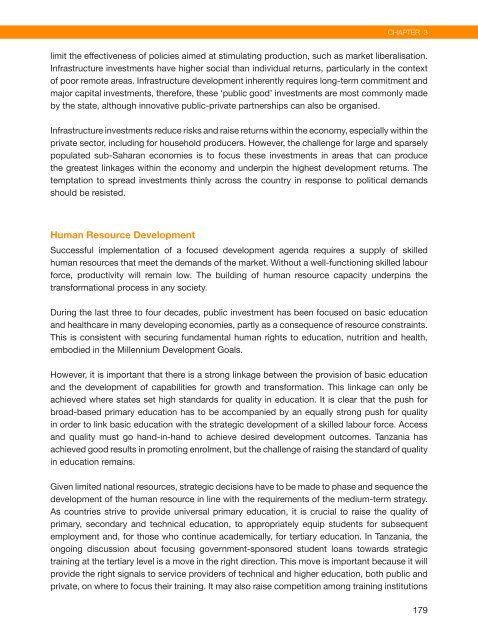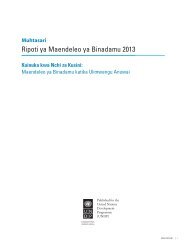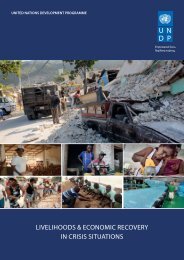Poverty and Human Development Report 2009 - UNDP in Tanzania
Poverty and Human Development Report 2009 - UNDP in Tanzania
Poverty and Human Development Report 2009 - UNDP in Tanzania
You also want an ePaper? Increase the reach of your titles
YUMPU automatically turns print PDFs into web optimized ePapers that Google loves.
Chapter 3<br />
limit the effectiveness of policies aimed at stimulat<strong>in</strong>g production, such as market liberalisation.<br />
Infrastructure <strong>in</strong>vestments have higher social than <strong>in</strong>dividual returns, particularly <strong>in</strong> the context<br />
of poor remote areas. Infrastructure development <strong>in</strong>herently requires long-term commitment <strong>and</strong><br />
major capital <strong>in</strong>vestments, therefore, these ‘public good’ <strong>in</strong>vestments are most commonly made<br />
by the state, although <strong>in</strong>novative public-private partnerships can also be organised.<br />
Infrastructure <strong>in</strong>vestments reduce risks <strong>and</strong> raise returns with<strong>in</strong> the economy, especially with<strong>in</strong> the<br />
private sector, <strong>in</strong>clud<strong>in</strong>g for household producers. However, the challenge for large <strong>and</strong> sparsely<br />
populated sub-Saharan economies is to focus these <strong>in</strong>vestments <strong>in</strong> areas that can produce<br />
the greatest l<strong>in</strong>kages with<strong>in</strong> the economy <strong>and</strong> underp<strong>in</strong> the highest development returns. The<br />
temptation to spread <strong>in</strong>vestments th<strong>in</strong>ly across the country <strong>in</strong> response to political dem<strong>and</strong>s<br />
should be resisted.<br />
<strong>Human</strong> Resource <strong>Development</strong><br />
Successful implementation of a focused development agenda requires a supply of skilled<br />
human resources that meet the dem<strong>and</strong>s of the market. Without a well-function<strong>in</strong>g skilled labour<br />
force, productivity will rema<strong>in</strong> low. The build<strong>in</strong>g of human resource capacity underp<strong>in</strong>s the<br />
transformational process <strong>in</strong> any society.<br />
Dur<strong>in</strong>g the last three to four decades, public <strong>in</strong>vestment has been focused on basic education<br />
<strong>and</strong> healthcare <strong>in</strong> many develop<strong>in</strong>g economies, partly as a consequence of resource constra<strong>in</strong>ts.<br />
This is consistent with secur<strong>in</strong>g fundamental human rights to education, nutrition <strong>and</strong> health,<br />
embodied <strong>in</strong> the Millennium <strong>Development</strong> Goals.<br />
However, it is important that there is a strong l<strong>in</strong>kage between the provision of basic education<br />
<strong>and</strong> the development of capabilities for growth <strong>and</strong> transformation. This l<strong>in</strong>kage can only be<br />
achieved where states set high st<strong>and</strong>ards for quality <strong>in</strong> education. It is clear that the push for<br />
broad-based primary education has to be accompanied by an equally strong push for quality<br />
<strong>in</strong> order to l<strong>in</strong>k basic education with the strategic development of a skilled labour force. Access<br />
<strong>and</strong> quality must go h<strong>and</strong>-<strong>in</strong>-h<strong>and</strong> to achieve desired development outcomes. <strong>Tanzania</strong> has<br />
achieved good results <strong>in</strong> promot<strong>in</strong>g enrolment, but the challenge of rais<strong>in</strong>g the st<strong>and</strong>ard of quality<br />
<strong>in</strong> education rema<strong>in</strong>s.<br />
Given limited national resources, strategic decisions have to be made to phase <strong>and</strong> sequence the<br />
development of the human resource <strong>in</strong> l<strong>in</strong>e with the requirements of the medium-term strategy.<br />
As countries strive to provide universal primary education, it is crucial to raise the quality of<br />
primary, secondary <strong>and</strong> technical education, to appropriately equip students for subsequent<br />
employment <strong>and</strong>, for those who cont<strong>in</strong>ue academically, for tertiary education. In <strong>Tanzania</strong>, the<br />
ongo<strong>in</strong>g discussion about focus<strong>in</strong>g government-sponsored student loans towards strategic<br />
tra<strong>in</strong><strong>in</strong>g at the tertiary level is a move <strong>in</strong> the right direction. This move is important because it will<br />
provide the right signals to service providers of technical <strong>and</strong> higher education, both public <strong>and</strong><br />
private, on where to focus their tra<strong>in</strong><strong>in</strong>g. It may also raise competition among tra<strong>in</strong><strong>in</strong>g <strong>in</strong>stitutions<br />
179





